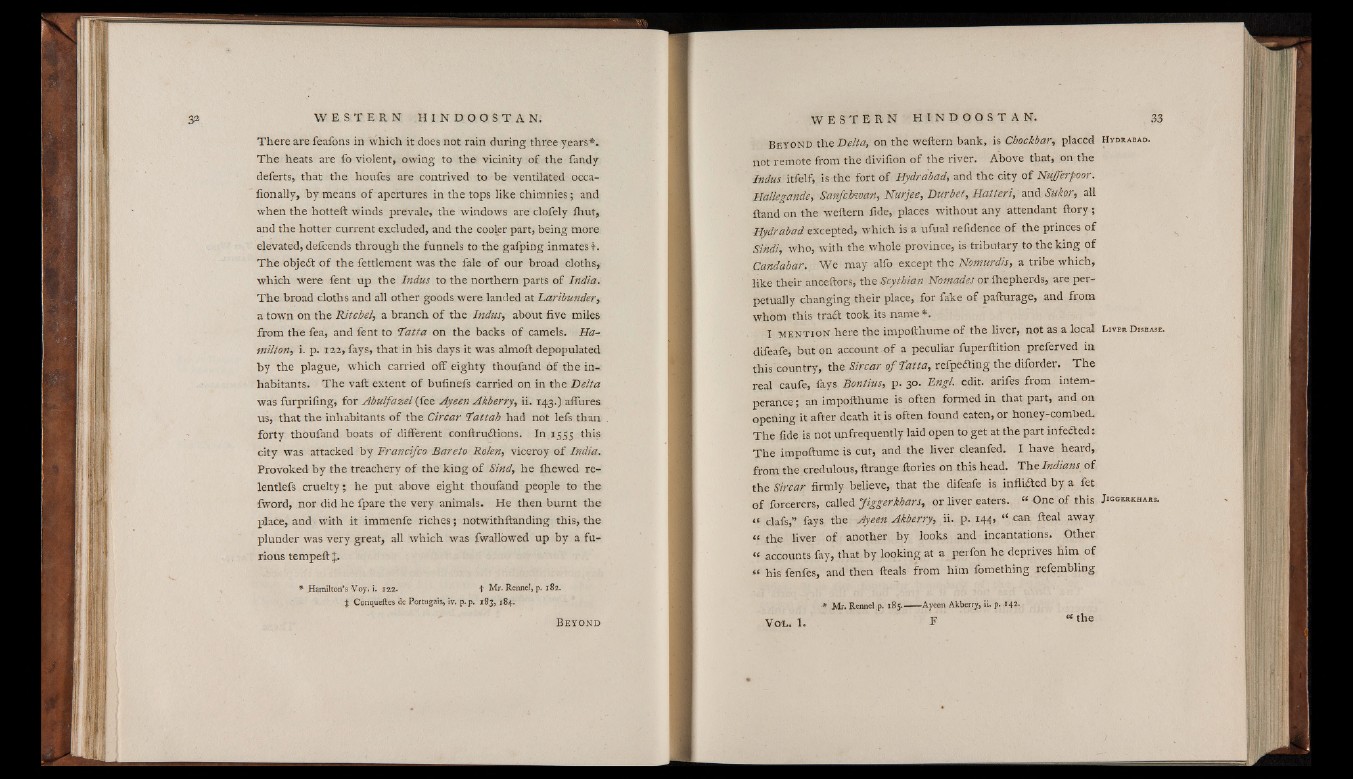
T h e re are feafons in w h ich it does not rain du ring three years*.
T h e heats are fo v iolent, ow in g to th e vic in ity o f the fandy
deferts, th at th e houfes are contrived to be ventilated occa-
fionally, b y means o f apertures in the tops lik e ch im n ie s ; and
wh en th e hotteft winds prevale, the windows are clofely ih u t,
and the hotter current excluded, and the cooler part, b e in g more
elevated, deicends th ro u gh the funnels to the g a fp in g inmates+.
T h e o b je it o f the fettlement was the fale o f our broad cloths,
w h ich we re fent u p th e Indus to the northern parts o f India.
T h e broad cloths and all other goods were landed at Laribunder,
a town on the Ritchel, a branch o f th e Indus, about five miles
from the fea, and fent to Patta on th e backs o f camels. Hamilton,
i. p. 122, fays, th at in his days it was almoft depopulated
b y th e p lague , w h ich carried o ff e ig h ty thoufand ¿ f the in habitants.
T h e vaft extent o f bufinefs Carried on in the Delta
was furp r ifin g, fo r Abulfazel (fee Ayeen Akberry, ii. 143.) affures
u s, th at the inhabitants o f th e Circar Pattah had not lefs than
fo r ty thoufand boats o f different conftrudlions. In 1555 this
c ity was attacked b y Francifco Bareto Rolen, v ice roy o f India.
Provoked b y the treachery o f the k in g o f Sind, h e ih ewed re -
lentlefs c ru e lt y ; h e pu t above e igh t thoufand people to the
iw o rd, nor did h e fpare the v e r y animals. He then bu rnt the
place, and w ith it immenfe r ic h e s ; notwithftanding this, the
plunder was v e r y great, all w h ich was fwallowed u p b y a fu rious
tem p e ftj.
* Hamilton’s Voy. 1. 122. + Mr. Rennel, p. 182.
% Conqueftes de Portugais, iv. p.p. 183, 184.
B e y o n d
B e y o n d the Delta, on the weftern bank, is Cbockbar, placed Hydrabad.
not remote from the divifion o f the river. A bo ve that, on the
Indus itfelf, is the fort o f Hydrabad, and the city o f Nujerpoor.
Hallegande, Sanfchwan, Nurjee, Durbet, Hatteri, and Suitor, all
ftand on the weftern fide, places w ith out any attendant f to r y ;
Hydrabad excepted, w h ich is a ufu al refidence o f the princes o f
Sihdi, wh o, with the wh ole province, is tributary to the k in g o f
Candahar. W e may alfo except the Nomurdis, a tribe w h ich ,
lik e their anceftors, the Scythian Nomades or fhepherds, are perpetually
ch ang ing their place, for fake o f pafturage, and from
whom this tra£t took its name *.
I m e n t i o n here the impofthume o f the liv er , not as a local L i v e r D i s e a s e .
difeafe, b u t on account o f a peculiar fuperftition preferved in
this country, the Sircar of Patta, re fp e ftin g the diforder. T h e
real caufe, fays Bontius, p. 30. Engl. edit, arifes from intemperance
; an impofthume is often formed in that part, and on
opening it after death it is often found eaten, or honey-combed.
T h e fide is not unfrequently laid open to g e t at the part infedted:
T h e impoftume is cut, and the liv e r cleanfed. I have heard,
from the credulous, ftrange ftories on this head. T h e Indians o f
the Sircar firmly believe, that the difeafe is in fli& ed b y a, fe t
o f forcerers, called Jiggerkhars, o r liv e r eaters. “ One o f th is Jiggerkhars.
“ clafs,” fays the Ayeen Akberry, ii. p. 144, “ can fteal away
“ th e liv er o f another b y looks and incantations. Other
u accounts fay, that b y looking at a perfon h e deprives h im o f
« his fenfes, and th en fteals from him fomething re fem blin g
■* M r . Rennel.p. 18 5 Ayeen Akberry, ii. p. .14 2 .
V o -L . 1 . F
u t h e